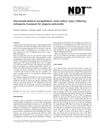 3 citations,
April 2018 in “Cosmetics”
3 citations,
April 2018 in “Cosmetics” As people get older, they have less active hair growth, but women have thicker hair than men and respond better to hair loss treatments.
 3 citations,
May 2013 in “Journal of the American Association of Nurse Practitioners”
3 citations,
May 2013 in “Journal of the American Association of Nurse Practitioners” Use minoxidil or finasteride first, then try HairMax LaserComb if needed.
 3 citations,
February 2010 in “Clinical kidney journal”
3 citations,
February 2010 in “Clinical kidney journal” Combining ciclosporin and simvastatin can cause severe kidney damage.
 3 citations,
November 2009 in “BMC dermatology”
3 citations,
November 2009 in “BMC dermatology” Dermatologists' treatment of alopecia areata is inconsistent, especially for children and advanced stages.
 3 citations,
November 1999 in “Journal of Cutaneous Medicine and Surgery”
3 citations,
November 1999 in “Journal of Cutaneous Medicine and Surgery” AGA is a genetic, hormonal hair loss treated with finasteride, minoxidil, and supplements, but new compounds are being developed.
 2 citations,
October 2018 in “Springer eBooks”
2 citations,
October 2018 in “Springer eBooks” Cancer treatments can cause skin-related side effects that may affect patient quality of life and require changes in treatment.
 2 citations,
July 2018 in “Elsevier eBooks”
2 citations,
July 2018 in “Elsevier eBooks” Some supplements may help with hair loss, but there's not enough strong evidence to recommend them without doctor advice.
 2 citations,
January 2018 in “Elsevier eBooks”
2 citations,
January 2018 in “Elsevier eBooks” Targeted therapies for lung cancer are effective but require careful management of side effects to benefit patients.
 2 citations,
November 2017 in “Journal of Cosmetic and Laser Therapy”
2 citations,
November 2017 in “Journal of Cosmetic and Laser Therapy” JetPeel-assisted minoxidil improves hair density and thickness more than minoxidil alone.
 2 citations,
April 2017 in “Plastic and Aesthetic Nursing”
2 citations,
April 2017 in “Plastic and Aesthetic Nursing” Platelet-rich plasma therapy shows promise for hair regrowth in alopecia patients.
 2 citations,
January 2012 in “Hair therapy & transplantation”
2 citations,
January 2012 in “Hair therapy & transplantation” DDAIP-HCl significantly increases minoxidil absorption into the skin.
 2 citations,
September 2007 in “International Journal of Impotence Research”
2 citations,
September 2007 in “International Journal of Impotence Research” Local testosterone treatment improved sexual desire in a female with fragile X syndrome.
 1 citations,
July 2020 in “Dermatology”
1 citations,
July 2020 in “Dermatology” Photobiomodulation helps reduce pain, lessen inflammation, heal wounds, and can be used in skin treatments. It also boosts hair growth in women with hair loss and may help fight microbes and prevent respiratory issues in COVID-19.
 1 citations,
April 2019 in “Journal of Investigative Dermatology”
1 citations,
April 2019 in “Journal of Investigative Dermatology” Dupilumab is effective and safe for treating moderate-to-severe atopic dermatitis in adolescents.
 1 citations,
April 2019 in “Journal of Investigative Dermatology”
1 citations,
April 2019 in “Journal of Investigative Dermatology” VB1953 gel significantly reduced acne and resistant bacteria in patients who didn't respond to clindamycin.
 1 citations,
June 2017 in “International Journal of Toxicology”
1 citations,
June 2017 in “International Journal of Toxicology” Most drugs fail to reach the market, but understanding their properties and using strategies like early toxicity tests and drug repurposing can help advance their development.
 1 citations,
January 2015 in “Journal of nutrition & health”
1 citations,
January 2015 in “Journal of nutrition & health” Fish oil improves skin health in people with diabetes and high cholesterol.
 1 citations,
November 2011 in “Archives of Dermatology”
1 citations,
November 2011 in “Archives of Dermatology” A woman's hair loss was caused by her husband's testosterone gel and a diabetic man's nail disease led to bone infection, both treated successfully.
 1 citations,
January 2010 in “Springer eBooks”
1 citations,
January 2010 in “Springer eBooks” Certain micronutrients may improve hair and nail health, but more research is needed to confirm their benefits.
 1 citations,
October 2002 in “Dermatologic Surgery”
1 citations,
October 2002 in “Dermatologic Surgery” Minoxidil can increase hair density, speed up regrowth in transplanted hair, and slow down further hair loss, especially beneficial for women, young men with thinning hair, and those wanting to reconstruct the back of the scalp.
 1 citations,
November 2001 in “British Journal of Dermatology”
1 citations,
November 2001 in “British Journal of Dermatology” Oral cyclosporin doesn't stop hair loss.
 1 citations,
February 1999 in “Journal of Paediatrics and Child Health”
1 citations,
February 1999 in “Journal of Paediatrics and Child Health” The document concludes that each reviewed medical book is useful for its specific area in pediatric care, especially the "Neonatal Formulary" for neonatal drug information.
 October 2024 in “International Journal of Pharmaceutical Sciences Review and Research”
October 2024 in “International Journal of Pharmaceutical Sciences Review and Research” A 5% minoxidil spray could effectively treat male baldness with fewer side effects and better patient comfort.
 August 2024 in “Frontiers in Pharmacology”
August 2024 in “Frontiers in Pharmacology” Antibody treatments show promise for hair loss but need more research.
 July 2024 in “Forum Dermatologicum”
July 2024 in “Forum Dermatologicum” Topical treatments for hair loss can be effective but need careful safety evaluation.
 July 2024 in “ADMET & DMPK”
July 2024 in “ADMET & DMPK” Surface-modified nanostructured lipid carriers can improve hair growth treatments.
 June 2024 in “Georgetown medical review”
June 2024 in “Georgetown medical review” Finasteride treats hair loss but may cause low libido, erectile issues, and depression.
 May 2024 in “Deleted Journal”
May 2024 in “Deleted Journal” Dutasteride effectively treats hair loss in men who don't respond to finasteride.
 May 2024 in “International journal of nanomedicine”
May 2024 in “International journal of nanomedicine” Plant-derived extracellular vesicles show promise for treating diseases like cancer and inflammation.

Early detection and comprehensive treatment of PCOS are crucial due to its long-term health impacts and associated risks.





























